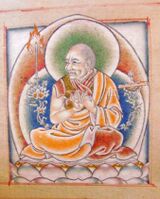'gos lo tsA ba gzhon nu dpal: Difference between revisions
No edit summary |
No edit summary |
||
| Line 18: | Line 18: | ||
|TibDateAnimal=Monkey | |TibDateAnimal=Monkey | ||
|TibDateRabjung=7 | |TibDateRabjung=7 | ||
|ReligiousAffiliation= | |ReligiousAffiliation=Karma Kagyu | ||
|StudentOf=Shamarpa, 3rd; Karmapa, 5th; Tsong kha pa; Rong ston shes bya kun rig | |StudentOf=Shamarpa, 3rd; Karmapa, 5th; Tsong kha pa; Rong ston shes bya kun rig | ||
|TeacherOf=Shamarpa, 4th; Karmapa, 7th; | |TeacherOf=Shamarpa, 4th; Karmapa, 7th; | ||
Revision as of 13:48, 17 July 2018
| PersonType | Category:Classical Tibetan Authors |
|---|---|
| MainNamePhon | Gö Lotsāwa Zhönu Pal |
| MainNameTib | འགོས་ལོ་ཙཱ་བ་གཞོན་ནུ་དཔལ་ |
| MainNameWylie | 'gos lo tsA ba gzhon nu dpal |
| AltNamesTib | ཡིད་བཟང་རྩེ་བ་ · མགོས་ལོ་ཙཱ་བ་གཞོན་ནུ་དཔལ་ |
| AltNamesWylie | yid bzang rtse ba · mgos lo tsA ba gzhon nu dpal · 'gos lo tsā ba gzhon nu dpal |
| YearBirth | 1392 |
| YearDeath | 1481 |
| BornIn | grong nag me dgu ('phyongs rgyas) |
| TibDateGender | Male |
| TibDateElement | Water |
| TibDateAnimal | Monkey |
| TibDateRabjung | 7 |
| ReligiousAffiliation | Karma Kagyu |
| StudentOf | Third Shamarpa Chopel Yeshe · Fifth Karmapa Deshin Shekpa · Tsongkhapa · Rongtön Sheja Kunrik |
| TeacherOf | Fourth Shamarpa Chodrak Yeshe · Seventh Karmapa Chödrak Gyatso |
| BDRC | https://www.tbrc.org/#!rid=P318 |
| Treasury of Lives | https://treasuryoflives.org/biographies/view/Go-Lotsawa-Zhonnu-Pel/5500 |
| Himalayan Art Resources | https://www.himalayanart.org/search/set.cfm?setID=976 |
| IsInGyatsa | No |
| PosBuNayDefProv | Definitive |
| PosBuNayDefProvNotes |
|
| PosWheelTurn | Third Turning |
| PosYogaMadhya | Yogācāra |
| PosYogaMadhyaNotes | Though his own view is based on Mahamudra, for which he asserts RGV is an important basis. |
| PosAnalyticMedit | Meditative Tradition |
| PosAnalyticMeditNotes | "That Zhönu Pal comments on the Ratnagotravibhāga from within the tradition of meditation is also clear from his colophon:
The Dharma master Drigungpa [Jigten Sumgön] rejoiced in Jé Gampopas statement that the basic text of these mahāmudrā instructions of ours is the [Ratnagotravibhãga] Mahãyãnottaratantraśāstra composed by the illustrious Maitreya; and since it is evident that the notes to [his] Uttaratantra explanations, the points he makes when presenting the three dharmacakras, and also the explanations deriving from Sajjana’s heart disciple Tsen Kawoché, are [all] in accordance with mahāmudrā proper, I have relied on them and have made [this] clear to others as best as I could. (DRSM, 574.9-12)" Klaus-Dieter Mathes, A Direct Path to the Buddha Within, p. 368. |
| PosEmptyLumin | Tathagatagarbha as Mind's Luminous Nature |
| PosEmptyLuminNotes |
|
| Other wikis |
If the page does not yet exist on the remote wiki, you can paste the tag |
"Tathagatagarbha as Mind's Luminous Nature" is not in the list (Tathāgatagarbha as the Emptiness That is a Non-implicative Negation (without enlightened qualities), Tathāgatagarbha as the Emptiness That is an Implicative Negation (with enlightened qualities), Tathāgatagarbha as Mind's Luminous Nature, Tathāgatagarbha as the Unity of Emptiness and Luminosity, Tathāgatagarbha as a Causal Potential or Disposition (gotra), Tathāgatagarbha as the Resultant State of Buddhahood, Tathāgatagarbha as the Latent State of Buddhahood that is Obscured in Sentient Beings, There are several types of Tathāgatagarbha, Tathāgatagarbha was Taught Merely to Encourage Sentient Beings to Enter the Path) of allowed values for the "PosEmptyLumin" property.

